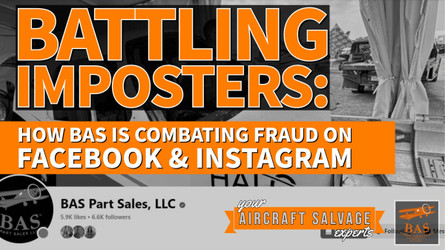Battling Imposters: How BAS is Combating Fraud on Facebook and Instagram
Posted by Clinton McJenkin on Sep 19th 2024
We recently added the little blue check verification to the BAS Facebook page and Instagram account, called Meta Verified, as we work diligently to combat the fraud and BAS imposters on both Facebook and IG. This blue check verification adds a layer of security and authenticity for the customers interacting with us on these social media platforms. But why is this necessary? Why is that little blue check so important? Let me dive a little deeper and explain the problems we are dealing with...


Facebook and Aviation

Airplane people have a love-hate relationship with Facebook. On one hand, it gives us a place to congregate and talk about the things we love so much. There are countless groups dedicated to your favorite airplane or for parts and avionics to fit it. On the other hand, Facebook seems to care very little about the fraud and cybercrime that happens on its platform.
At every aviation show, I talk to customers who love and hate Facebook. The community and comradery of engaging with other aviators flying the same aircraft or from the same background are compelling and, in many ways, powerful. But the issue of scammers, spammers, and fraud is maddening. And that fraud impacts everyone, even if you are not buying airplane parts on Facebook. It impacts the airplane owner who wants to unload his avionics to another pilot. It impacts businesses like ours and many, many others. It has a ripple effect across the aviaiton community.
Over the past few years, we have chased down an untold number of fraudsters, fake BAS pages, scam artists, and other criminals who steal our images or our identities and work hard to convince you to send them money over Venmo or CashApp. Fake airplane parts groups are also a thing. As I write this, a fake BAS page on Facebook claims to be our Virginia Branch - we don't have a Virginia Branch. Another fake BAS page is the admin of a scam airplane parts group, giving pseudo-legitimacy to the group. We can currently count 8 fake BAS pages. Of course, we have reported these as imposters repeatedly and often. Facebook has yet to take any action.
Before We Jump Into The Deep End
Facebook has deeply authenticated the BAS Part Sales Facebook page and Instagram account and now show the blue check verification. When you see that little blue check, you know that Facebook has verified that the user or business page is legitimate and authentic. This adds layers of security for us, and Facebook claims they will do more to combat the imposters and scammers; we'll see what that truly means in the real world over time. But for now, be sure you are interacting with the blue check BAS page and have some confidence in its authenticity.
Learn more about Meta Verified and what that little blue check stands for.
The point of writing this article is to bring attention to the scale of the problem and what we are doing to combat the criminals. I wrote the article below several years ago and updated it again last year on the same subject: Airplane Parts Scams on Facebook...
How The Scams Work
Number one is the scammer who steals our images and product details, typically from our Facebook post, and then post them as his own with a note to message him for more information. It's common for these scammers turn off commenting, so it's harder to call them out. I report these instances quickly to everyone I can: Facebook, the group admin, etc. With enough pressure, the group admin will remove them, or the scammer will run and hide.
Number two is a fake profile, such as the list below. These are clones of our BAS page. But they also clone our personal profiles in the same effort to make you think it's all legit. We report these as imposters and tell Facebook who they are trying to imitate. In the first Facebook Scam blog post I wrote a while back, click here, I had some screen shots of a fake Geoff Watkins (BAS Sales Rep) profile using Gmail and a Google Voice number to offer parts we had for sale. It looked like Geoff, at least on the surface. If you dug deeper you saw that the fake Geoff profile was a big fan of Kenyan nightclubs, as in Kenya the African nation. I snagged that screen shot after someone fell victim to the scammer and sent money via Venmo.
The third is more challenging to combat. You, the Facebook user pilot looking for a widget, might post in your group that you need said widget. Then you get a FB message with some slick images from someone who can talk the talk. The price is outstanding, and they present a logical, thoughtful back story about why it's for sale. It seems legit, and then comes the "sale." Sometimes, it's a straight-up Venmo transaction. Sometimes, it's a fake invoice, as we posted in this article (below).
Part of the root problem, and what happens often, is that the scammer deletes the profile and starts a new one. Commonly, I get blocked, so I can not see the scammer's posts at all. I am currently blocked from a scam group with a scam BAS page as an admin of the group. I caught them, called them out, and reported them, and I was quickly blocked, so they just will not appear anywhere on my Facebook in any form.
Imposter BAS Facebook Pages & Profiles
Here is a list of fake BAS pages that my teams has found recently. If you are feeling froggy, you can report these as a fake business...
• https://www.facebook.com/profile.php?id=61563820539526 <-- this fake profile is also the admin of an airplane parts group!
• https://www.facebook.com/groups/363531496662327/user/61563820539526
• https://www.facebook.com/profile.php?id=61551897158256
• https://www.facebook.com/baspartsalesllc <-- this one claimed their Facebook handle!
• https://www.facebook.com/profile.php?id=61553197643630 <-- this fakey stole pictures of our kids and families to make it look more legitimate
• https://www.facebook.com/profile.php?id=61556407285382

We have also found fake Instagram accounts pretending to be BAS or trying to sell our parts.
Pay Attention To The Details
Whenever a BAS employee posts on Facebook, we always use our company credentials. We use @baspartsalesmart.com email address, never a Gmail address or any other. We always post a phone number you can call and verify as a BAS number, never a cell phone or Google Voice number. We will never request funds via CashApp or Venmo directly through Facebook. You can use CashApp and Venmo when you check out on our website, and you can buy directly from our Facebook and Instagram Shops, where Facebook processes the transaction. However, we do not create transactions outside our systems or request funds outside our systems.
The Victims Are Real
We have heard from many people who have been scammed or were close to being scammed by these nefarious Facebook posers. The stories are typically similar: the price is fantastic, the images look authentic, the scammer can talk to the talk, etc. What seems to determine who becomes a victim lies in how much work that individual will do to verify the details before sending money.
You should always use Google to verify regardless of who you are interacting with. Asking questions, asking to authenticate the person and the parts, asking for more pictures, and then looking closely at the background and context of the images are all good ways to move forward with a legitimate transaction. Any legitimate business should be easily verifiable outside of the Facebook platform. This is where we see people get taken. They don't do any diligence; they assume it's all good and the price is so amazing that they get caught in the ether and don't do a single Google search to verify. They don't call the phone number or wonder why it's a Google voice number.
Google Voice numbers are impossible to trace and can be turned on and off in less than a minute. They can also be set up with any area code you like. They are perfect for a scam artist!
Here is an example of a fake invoice sent to a Facebook user who thought he was interacting with a BAS employee over Messenger. The invoice came with a payment link to a legitimate online invoicing platform called Bookipi. Now, put yourself in the customer's shoes for a minute. The guy claimed to be a BAS employee named Tom. He sent an invoice that looks legit, and a link to a live payment system - it even has an Apple Pay ID. The potential victim came to our site and discovered that we did not have an employee named Tom and promptly contacted us.
I did reach out the invoiving platform and provided some details to them about this particular case. I was informed they disabled the scammers account so he cant send any more fake invoices.

Taking Action
A Great Facebook Group To Join
There is a Facebook group dedicated to outing the aviation scammers specifically - Aviation Scams. As you scroll through this page, you will notice a handful of patterns. The "pretty girl" scam, where the profile is of an attractive young lady, is meant to put you at ease. One of the other common themes is cloning legit people. My Facebook profile has been cloned and used in an attempt to scam people over airplane parts. As has one of our sales reps, Geoff Watkins. We know this is happening with other aviation companies, too.
This group documents individual profiles, scam pages, and aviation groups with a lot of fraudulent activity. Most of the info comes from other users. So, if you see something fishy, be sure to share the details with this group and document it.
Some Interesting Facebook Fraud Stats...
Here are some interesting statistics about cybercrime related specifically to Facebook:
• Phishing Attacks: Facebook is a common target for phishing attacks; reports indicated that around 50% of cybersecurity professionals identified social media platforms as key channels for phishing attempts.
• Spam Accounts: Facebook has reported that approximately 5% of its monthly active users are fake accounts, which can be used to perpetrate scams and cybercrime.
• Scam Reports: In 2020, users reported more than 2.5 million scams on Facebook, including various schemes involving fake products, lottery winnings, and investment fraud.
• Malware: A significant percentage of malware infections – around 7% – originated from social media platforms like Facebook, where malicious links are often shared.
• Fraudulent Activity: In 2021, Facebook reported removing over 1.7 billion fake accounts and blocking billions of pieces of content related to fraud and scams.
• Cybercrime Reporting: The Federal Trade Commission (FTC) reported that in 2021, Facebook was the most reported platform for online fraud, with users losing millions of dollars to scams conducted via social media.
Some Interesting Cybercrime Stats...
2. Data Breach Trends: The year 2021 witnessed a record of over 18 million data breaches, predominantly compromising personal information at an alarming rate.
3. Ransomware Menace: In 2022, ransomware attacks proliferated with reports indicating an alarming frequency of one attack occurring every 11 seconds, resulting in an average business loss of $1.85 million per attack.
4. Pervasive Phishing Incidents: Phishing attacks dominated the cybersecurity landscape in 2020, accounting for more than 80% of reported security incidents and establishing itself as the prevailing attack method among cybercriminals.
5. Malware Proliferation: With an estimated 1.5 billion instances of malware in circulation, the continuous creation of new variants each day adds to the escalating threat landscape.
6. Targeting Small Businesses: Findings reveal that small businesses are the focus of approximately 43% of cyberattacks, underscoring their susceptibility to cyber threats.
7. Insider Threats Impact: Negligence or deliberate misconduct by employees or contractors contributes to 34% of data breaches, emphasizing the substantial risk posed by insider threats.
8. Growing Cybersecurity Investments: In response to the escalating cyber threats, organizations are anticipated to funnel more than $170 billion into cybersecurity solutions by 2022 to fortify their defenses.
9. Dark Web Expansion: Illicit activities are rampant on the dark web, with 57.7% of listings attributed to illicit drugs and numerous transactions involving stolen data and hacking services.
10. Rising Cybercrime Incidents: A recent report highlighted that 49% of organizations worldwide encountered a cyberattack in the preceding year, illustrating the widespread prevalence of cybercrime across diverse industries.
Conclusion







